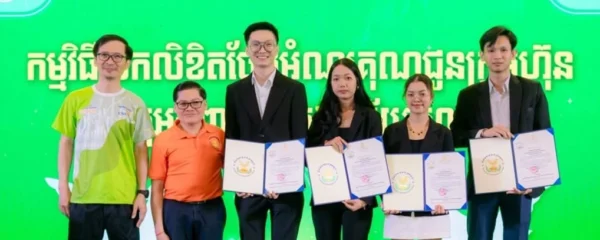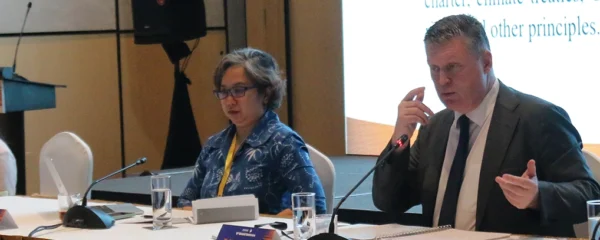New Sub-Decree on Value Added Tax in Cambodia
April 26, 2024
Note: All activities, publications, and events mentioned in this post were conducted under the name VDB Loi prior to our transition to Andersen in Cambodia on 18 September 2024.
The promulgation of Sub-Decree 49 ANKr. BK (referred to as the “New Sub-Decree”) on Value Added Tax (“VAT”) marks a positive update to the existing taxation framework, particularly the 1999 Sub-decree 114 ANKr.BK on VAT. Enacted by the General Department of Taxation (“GDT”) on 11 March, 2024, this new Sub-Decree introduces important updates and amendments aimed at streamlining VAT processes, enhancing tax compliance, and addressing the complexities of modern business transactions, particularly those through e-commerce.
Let’s delve into the key changes and provisions brought forth by this Sub-Decree:
- Integrated legal definitions from the Law on Taxation 2023 (the “LOT”) and Sub-decree 114 on VAT from 1999.
- Simplified definition: VAT Taxable Turnover now clarified as “refers to turnover from VAT taxable supply of goods or services.
- Under the new Sub-Decree, a taxable person must register for VAT within 15 days of becoming liable. (Previously, the registration period was 30 days under Sub-Decree 114.)
- According to the new Sub-Decree, if a taxable person’s registration is canceled, they are deemed to have sold all goods in hand, including current assets (instead of capital goods as previously stated in Article 26 of the older Sub-Decree 114). Consequently, they are liable for output tax on all goods for which input tax credit was received, with the output tax payable based on the fair market value of the goods at the time of registration cancellation.
- Taxable persons can claim input tax credit for taxable sales of goods and capital assets acquired prior to registration, but they are no longer allowed to claim credit for importation of goods made before registration. This change implies that while taxable persons can still offset VAT paid on goods sold and capital assets acquired before VAT registration against their output tax, they are no longer permitted to reclaim VAT paid on imports made before registration.
- The new Sub-Decree extended the period for recognizing VAT credit. Previously, VAT credit was allowed for all taxable supplies received and importation of goods made within the month. Now, VAT credit is recognized for taxable supplies received within the month or within 60 days thereafter. Similarly, for importation of goods, VAT credit is acknowledged within the month or within 60 days after importation. These changes provide taxable persons with an extended timeframe to account for VAT credit, aligning with practical business operations.
- The new Sub-Decree introduces clarity on taxable and non-taxable supplies. It mandates that taxable persons must accurately record and segregate VAT input used for taxable and non-taxable supplies. VAT input utilized for non-taxable supplies is not permissible for recognition as VAT input, as per Article 68(2) of the LOT.
- In the old Sub-decree 114, if only a part of a taxable person’s supplies is taxable, the credit allowed is calculated using the formula A x B/C, where A is the total input tax for the period, B is the total value of taxable supplies made during the period, and C is the total value of taxable and non-taxable supplies made during the period, excluding non-taxable business transfers. The new Sub-decree further clarifies that the value of B/C must be determined to two digits after the decimal point, without rounding up or down.
- The new Sub-Decree introduces an additional supporting document for claiming VAT input: the custom declaration and tax payment receipt, serving as evidence of VAT paid on imported goods.
- The new Sub-decree confirms and integrates the VAT refund treatment for exporters and QIPs outlined in Instruction No. 018 MEF.NT.GDT. It specifies that:
- Exporters and QIPs with excess input tax credits for three or more consecutive months can apply for a refund of the monthly excess input tax. They may submit their refund request to the Tax Department at the end of the third month or any subsequent month.
- The Tax Department will not issue refunds to taxable persons who request a tax refund but fail to declare their taxable transactions.
- Criteria for VAT invoice, taxable value, and non-taxable supplies for diplomatic missions and international organizations have been updated to align with the LOT.
- Under the old Sub-decree 114, the taxable person transferring the business was required to notify the GDT of the transfer within 10 days of its occurrence. This timeframe has now been extended to 15 days in the new sub-decree. Additionally, the previous requirement for the taxable person transferring the business to seek cancellation of registration has been removed in the new sub-decree.
- The new sub-decree incorporates definitions of B2B and B2C, outlines tax obligations for each scenario, and addresses timing of supply and input tax credits for e-commerce transactions based on existing VAT e-commerce regulations. It mandates that registered taxpayers to apply VAT reverse charge for digital goods or services and e-commerce transactions supplied by non-resident suppliers who do not have a permanent establishment in Cambodia, and supplying from outside to inside the Kingdom.
Recent Publications
Legal ReleaseTax Release
Cambodia to Launch the First Phase of the Customs Advance Ruling Request System
Legal Release
Recent News

Andersen Cambodia Recognized by SERC for Contributions to Capital-Market Development
Read More »
Edwin Vanderbruggen Attends MAP Day in Lausanne
Read More »
Edwin Vanderbruggen Presents at the Asian Society of International Law Biennial Conference
Read More »



